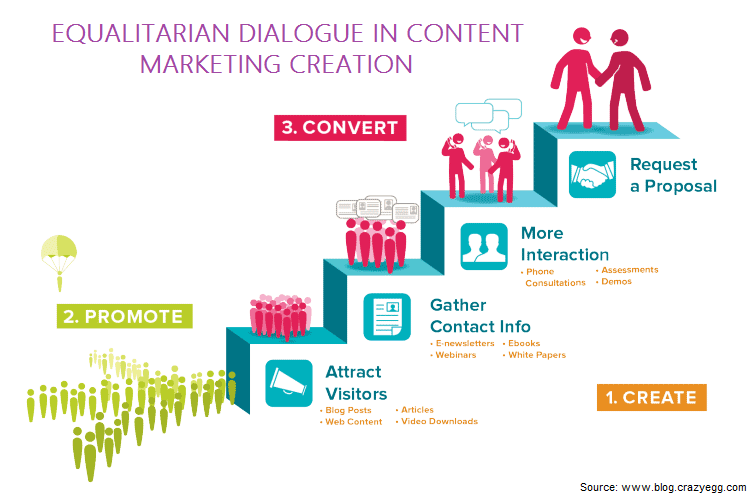The development of the Web 2.0 has allowed users and brands to interact and collaborate with each other through the construction of a dialogue mediated by social media platforms.
Similarly, it marks the surge of “content marketing” as a business communication strategy that helps companies to create and distribute important, relevant and consistent content using different internet channels in order to acquire a defined target public with the goal of driving profitable consumer response.
Thus, content marketing communication strategies focus on delivering information, constructed in an egalitarian dialogue approach, meaning that if traditional marketing attempts a one communication persuasion scheme to initiate and close a sale, content marketing is about helping buyers to make pragmatic and informed buying decisions while constructing a dialogue in which contributions are considered according to the validity of customers reasoning, instead the status or power position of the brands.
As stated in a study performed by the Content Marketing Institute (CMI), if brands want to succeed in creating relevant, engaging content marketing, they need to invite customers to shape the brand activities through a strategy of “active listening”. Moreover, customers are in constant dialogue with companies using social media platforms and their discourse and interactions help to create meaning to the marketing actions of the brand.
In addition, the CMI research elucidates that consumers are actively gathering information to really determine if a brand’s value proposition is consistent with its marketing communication strategy of fulfilling customers needs and expectations.
There has always been the power of referrals and peer-to-peer word of mouth and technology makes it much easier and more scalable for opinions to be formed quickly and perceptions to be influenced.
Why content marketing strategies should be created on an egalitarian dialogue approach?
- A content marketing strategy based on an egalitarian dialogue interaction can help companies to address customers’ needs and expectations in a more efficient way as it considers customers’ comments and reviews the main source of information about the brand image and its perception.
- Exploring users-generated content, insights and opinions through an egalitarian dialogue approach, helps to construct meaning to the marketing and communication actions of the brand and encourages customers to be active players in the evolution of the brand.
- Learning about brand followers and consumers profiles applying the concepts stated in the egalitarian dialogue communication theory, leads not only to a better content marketing creation but also to improve other companies’ marketing interactions such as consumer experience and engagement.
- Since brands are interacting more actively in social networks and other digital communication platforms, the concepts of brand image and product knowledge are no longer exclusive constructs of companies’ business activities. Both concepts mean different things to different users at different times and places and its meaning should be shaped mutually by customers and brands and not just imposed by the brand.
The web 2.0 has changed old paradigms about the traditional one way communication approach. The concept of egalitarian dialogue in the creation of content marketing has encouraged customers to be active participants in developing the brand’s marketing activities, to develop consensual actions between the brand and the customers in social media environments and to develop new communication dimensions that help to improve companies’ different business actions.
